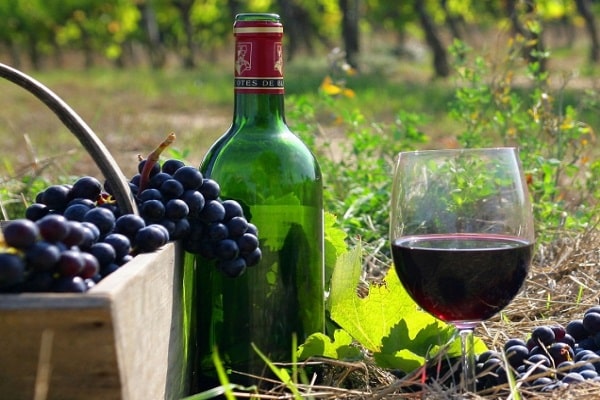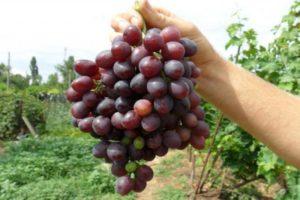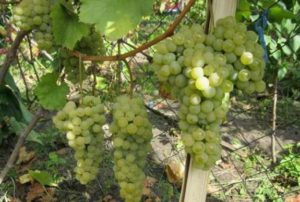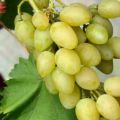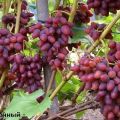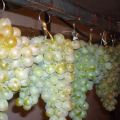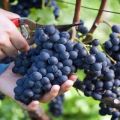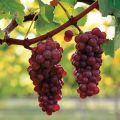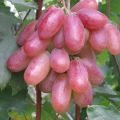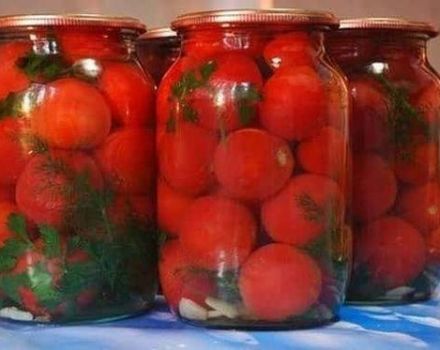Description of the best frost-resistant grape varieties and their fruiting, cultivation features
Grapes are among the most common crops among most gardeners. People come across this berry every day, as the plant is added to many foods. There are many varieties of culture. However, frost-resistant sweet grape varieties that grow even in the northern regions are especially popular. Before planting such grapes, you need to familiarize yourself with its varieties and cultivation characteristics.
History and features of withdrawal
IV Michurin is at the origin of the development of frost-resistant grape varieties. With its help, in the first half of the last century, the first winter-hardy berries were created that were able to withstand the winter temperature drop. In those years, the best frost-resistant varieties were bred, among which Metallichesky, Arctic, Concord are distinguished.

A few years later, breeder Ya. I. Potapenko joined the breeding of new grape species. He decided to create plants that will not only tolerate frost, but also cope with most diseases. His research ended with the creation of grapes such as Medovy, Stepnyak and Suvorovets.
Since the beginning of the sixties, domestic breeders have decided to create technical varieties that could be grown in Siberia. This was done by a scientist from Orenburg - Shatilov. He devoted several years of his life to creating the most resistant grape varieties. As a result, he created the Amur black and white grapes.
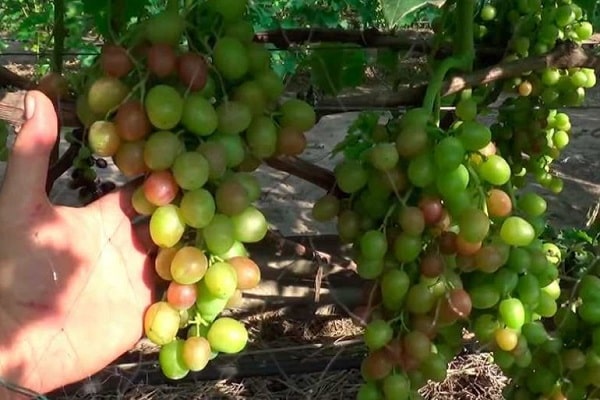
In the second half of the twentieth century, the work of breeders reached a new level, thanks to which large and winter-hardy grapes were grown on an industrial scale, even in areas with severe frosts. To date, many zoned varieties of grapes have been created that grow in open ground in Primorye, the Far East and the Urals.
Such plants are adapted for growing in conditions where the temperature drops below 30 degrees below zero.
What are the benefits?
There are a number of benefits to frost-tolerant varieties of vines that should be consulted before growing. The main advantages include the following:
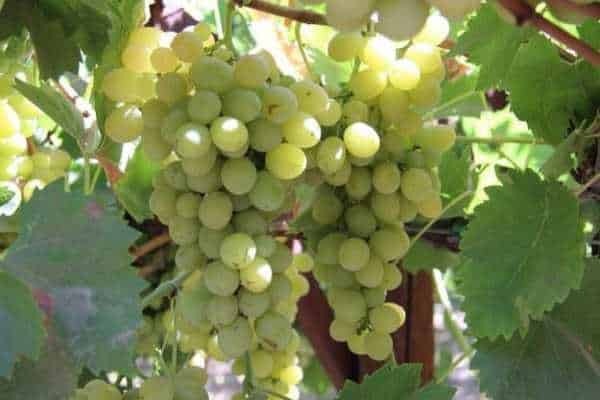
- Resistance to low temperature indicators. The main advantage of these grape varieties is that they are adapted to cold climates. Grape seedlings will grow normally without additional shelter, even if the temperature drops to 25-30 degrees below zero.
- Disease resistance. This is the second most important advantage of winter hardy plants. They are less likely than other varieties to be attacked by pests and do not suffer from any diseases.
- Transportability. The advantages of berries should be separately mentioned, which after being harvested are stored for a long time and transported even over long distances. The harvested grape harvest does not spoil for 3-4 weeks.

Early frost-resistant varieties
Among summer residents living in regions with a cold climate, winter-hardy grapes with early ripening of berries are popular. There are several early ripening varieties that are planted most often.
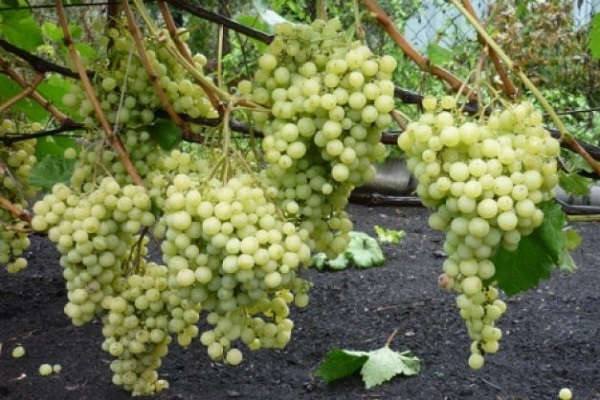
Transformation
Many lovers of early berries plant the Transfiguration grape variety in the garden, the bunches of which ripen within 95-105 days. The peculiarity of this grape is that it is able to bear fruit several times per season.
The transformation has large clusters weighing one and a half kilograms. If all agrotechnical rules are observed during cultivation, the mass of one brush can reach 2-3 kilograms. The bunches are composed of many conical berries, each weighing 10-20 grams.
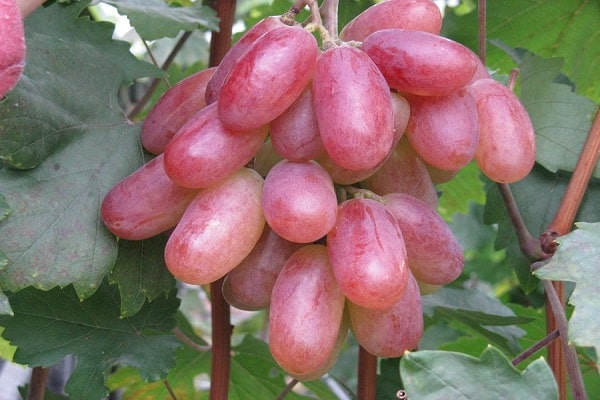
Victor
Victor is considered an early grape, the fruits of which ripen in early August or in the second half of July. Therefore, ripe brushes can be picked 70-80 days after the buds appear on the bushes.
Like the Transfiguration, ripe bunches are quite large and grow up to 1-2 kilograms. Victor's berries have an oblong shape, their length reaches 5-6 cm, and their weight is 13-15 grams. Among the differences, the taste of the fruit is distinguished, which is very juicy and sweet. The main advantages of Victor include the fact that his ripe berries do not crack even at high humidity.
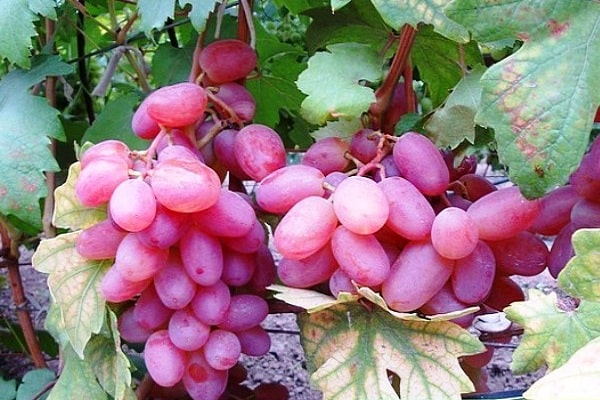
Laura
This is a high-yielding variety, the bushes of which are 80-85% fruiting shoots. Laura is covered with large, five-lobed leaves with a dark green tint.
Laura's bunches are small and weigh only 800-900 grams, but this does not affect the yield. Due to the fact that many brushes are tied on the bushes, 20-25 kilograms of berries are harvested from one plant.
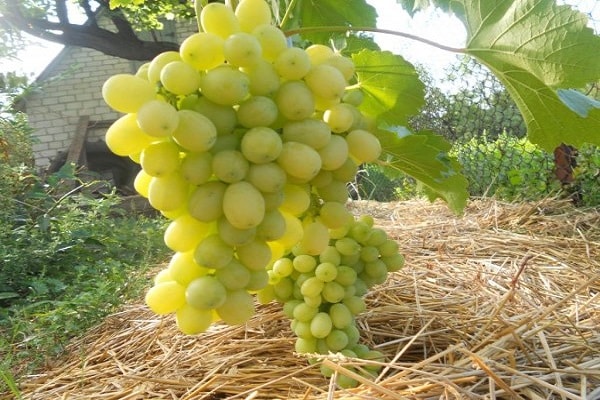
High frost resistance grapes
Inhabitants of the northern regions, where the temperature is stable, prefer to plant winter-hardy grape varieties in the garden. It is recommended to familiarize yourself in advance with varieties that are characterized by increased frost resistance.
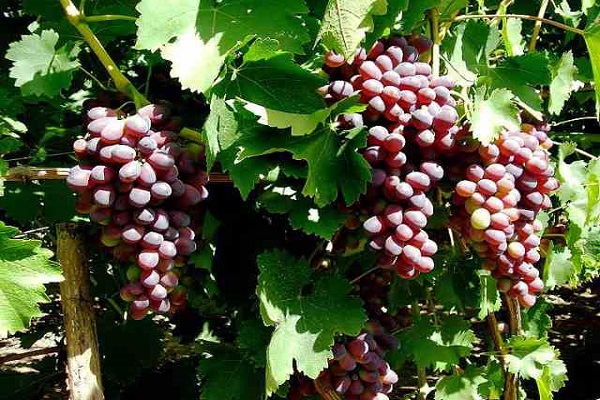
Lydia
Lydia is a hybrid grape variety that was bred by crossing Labrusa and Vinifera. The advantages of the plant include the taste of ripe fruits and a high level of productivity. Lydia is also appreciated for her beautiful bushes, with which you can decorate a summer cottage.
When grown on bushes, bunches are formed, which eventually take on a cylindrical shape. Each of them weighs only 100-150 grams.
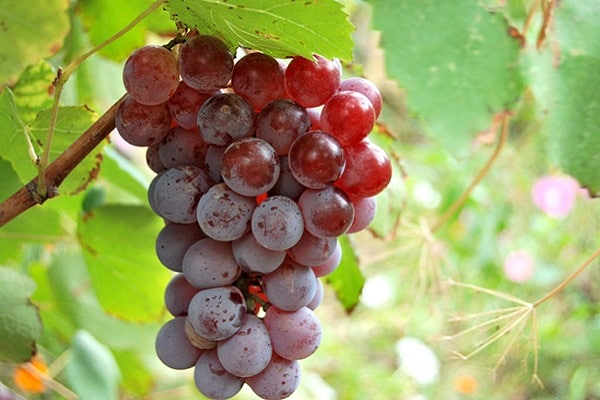
Tukay
Many growers classify Tukay as an early-ripening variety, as its berries ripen for 80-95 days. Sometimes the ripening of the fruit is delayed, but this does not affect the yield, since the variety tolerates frost. The berries are formed on cylindrical bunches. Their size may vary, as it depends on the conditions in which Tukai is grown.
The harvested crop of Tukay can be stored for more than three weeks without losing its taste. This allows ripe bunches to be transported over long distances.
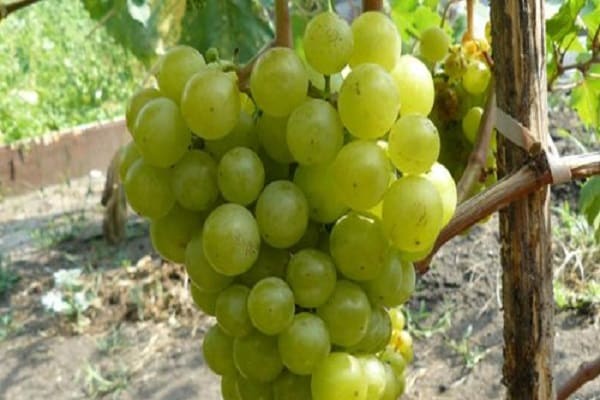
Cardinal
Cardinal is considered a rather old variety that was bred in America back in the 39th year of the last century. A few years later, they began to grow it not only in the United States, but also in Europe.
At the beginning of summer, large clusters begin to form on the Cardinal bushes.When they ripen, their length reaches thirty centimeters, and their weight is 650 grams.
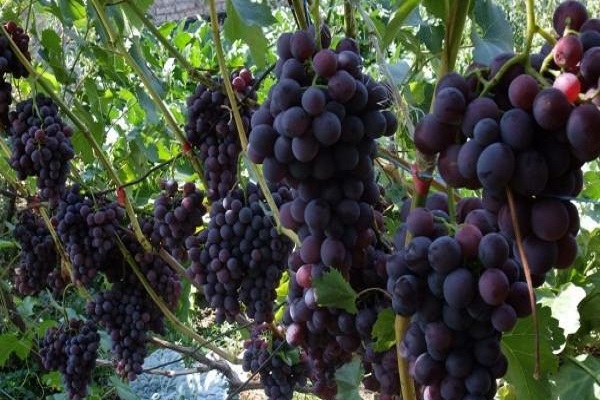
What are the non-covering varieties?
Many summer residents in regions with low temperatures grow grapes in special greenhouses. However, there are varieties that grow without additional cover.
Jupiter
This American variety was created in 1984 from the hardy Labrusca grapes. The characteristic features of Jupiter include the fact that its berries ripen in 80-90 days. Also, among the differences, the fact that flowering begins a week earlier than that of other early ripening plants is distinguished.
Jupiter's bushes are characterized by an average growth rate, they grow up to 2-3 meters. The advantages of grape seedlings include their resistance to pests and common diseases.
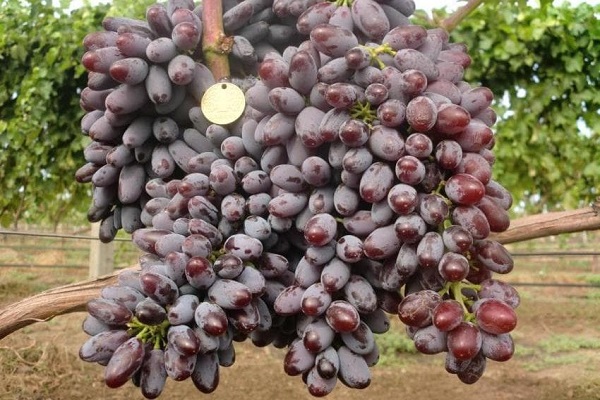
Alpha
To obtain this hybrid variety, varieties such as Labrus and Riparia were crossed. The result is a grape that grows without shelter at a temperature of 35 degrees below zero. Alpha has late ripening dates for the berries, and therefore they are engaged in harvesting only four months after the appearance of the buds.
The mass of each mature brush reaches 200 grams, and with proper cultivation, it can be achieved that their weight reaches 300 grams. Small berries of a round shape and weighing 3-5 grams are formed on the bunches.
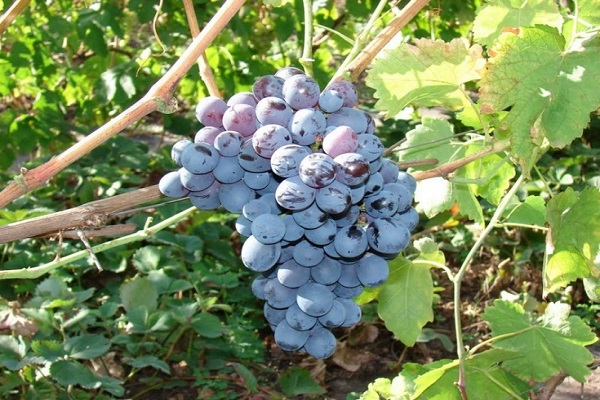
Platovsky
A technical variety of a plant with medium ripening times. Ripe berries are harvested in 100-120 days. The advantages of Platovsky include the fact that he is easy to care for. Thanks to this, even inexperienced growers can engage in cultivation of varieties.
Platovsky cannot boast of large bunches, since their weight is only 150 grams. Each bunch is densely covered with berries weighing 2-3 grams.
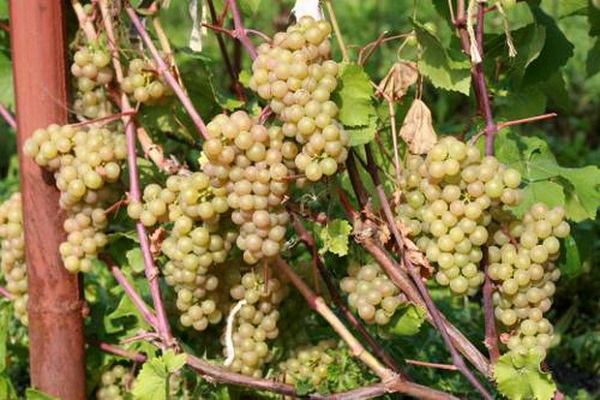
Growing features
To get a good harvest of frost-resistant grapes, you will have to familiarize yourself with the nuances of its cultivation. Therefore, it is necessary to familiarize yourself with several features of agricultural technology:
- Control of tying brushes. Most varieties of winter-hardy vines have high yields. If you do not remove extra brushes from the bushes, the plant's resistance to frost will deteriorate, and it will freeze.
- Stepping out. All grape seedlings are actively growing and grow up to 5-8 meters in height. Many shoots appear on the bushes, which should be removed regularly so that they do not interfere with the ripening of the berries. Stepping is carried out at least 2-3 times per season.
- Pollination. Some varieties have to be independently pollinated with special pollinators. Therefore, you should figure out in advance whether the planted grapes are self-pollinated or not.
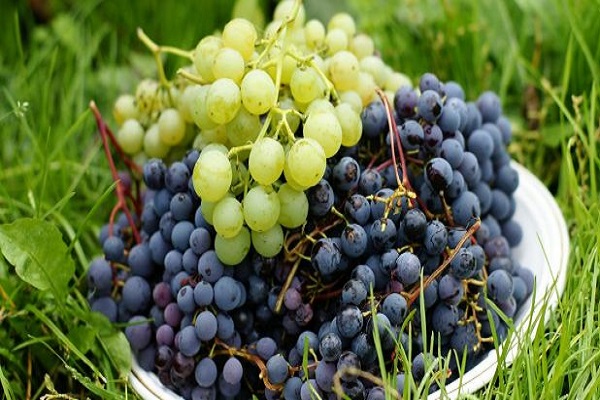
Conclusion
In regions with low temperatures, winter-hardy grape varieties have to be planted. However, before that, you should familiarize yourself with the main varieties of such grapes and the rules for its cultivation.
